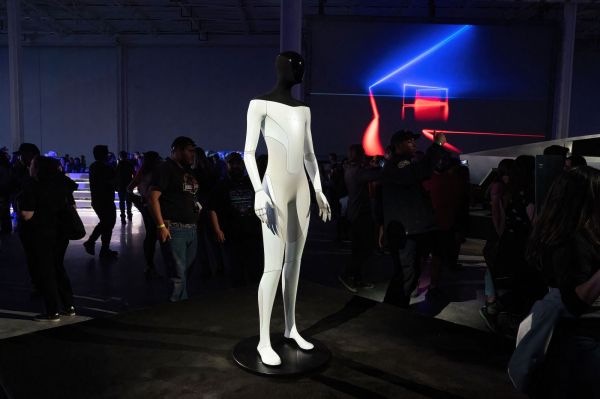Tesla robot targets 2023 – TechCrunch

Tesla CEO Elon Musk says the company’s robot, named Optimus, will be “worth more than the car business, worth more than FSD.”
FSD, or “full self-driving,” is Tesla’s advanced driver assistance system that relies on cameras and computer vision technology to perform some autonomous driving tasks. An FSD subscription costs Tesla owners about $12,000 per year.
The executive shared during the company’s first-quarter 2022 earnings call that Tesla is continuing to work on its robot. Optimus was first introduced in August 2021 during Tesla’s inaugural AI Day. The 5’8″ robot will rely on Tesla’s work in neural networks and Dojo advanced supercomputer, and Musk envisions it performing tasks that can otherwise be described as human drudgery — things like grocery shopping and other everyday tasks.
So far, all we’ve seen of the bot concept has been a person in a white spandex jumpsuit.
Earlier this month at Tesla’s Austin gigafactory opening, Musk said a new wave of products, like Optimus, will be introduced in 2023.
“I was surprised that people did not realize the magnitude of the Optimus robot program,” said Musk on Wednesday’s earnings call. “The importance of Optimus will become apparent in the coming years. Those who are insightful or looking, listening carefully, will understand that Optimus will ultimately be worth more than the car business, worth more than FSD.”
We’re not exactly calling bullshit on this, but the idea that Tesla will be able to get a robot like this to market any time soon seems rather unrealistic. Other companies have been trying to create humanoid robots to take over human work for years, and we’ve not heard a lick about why this could possibly work for Tesla, especially given the short time frame Musk is aiming for. After all, it took Boston Dynamics 25 years of dedicated learning to build Atlas, and other automakers like Honda, Toyota and General Motors have also unveiled robot concepts in recent years that have barely landed.
Why is that? Well, first there’s the question of whether a humanoid robot is actually the most efficient way to automate things. Then there’s the question of cost and scale. Because who is the target audience for a robot that will take away the human drudgery? The obvious answer is those who are currently toiling in the grind, people who don’t have enough money to outsource things like doing the laundry or grocery shopping. A Roomba alone could set you back $900. Will Tesla be able to scale its robot quick enough to the point of it being less than $10,000 a pop? Probably not.



